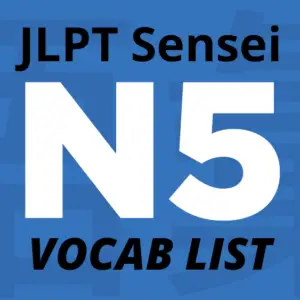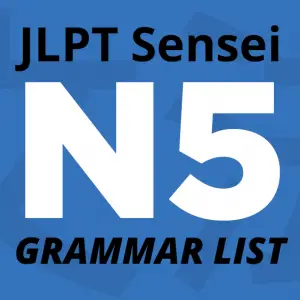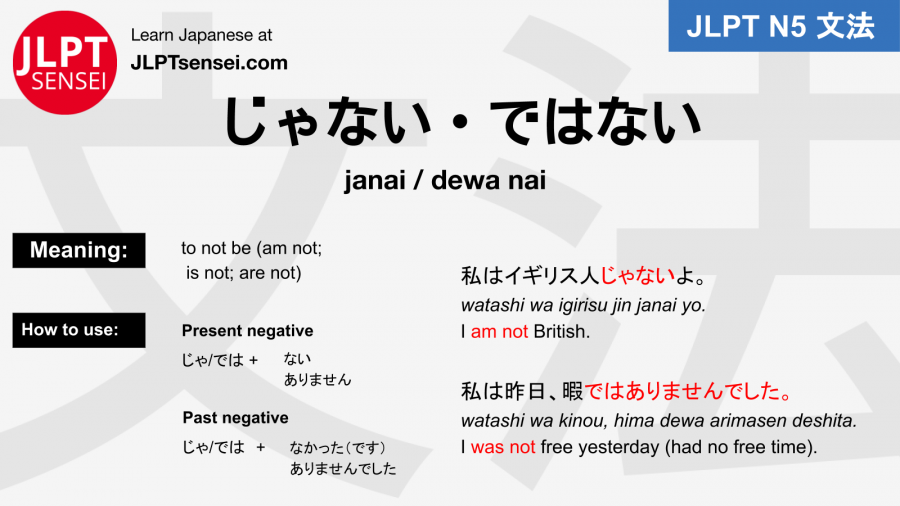Aprende gramática del idioma Japonés: じゃない (janai) & ではない (dewa nai). Significado: to not be (am not; is not; are not).
Make sure you review «to be» Part 1, before starting this lesson: だ・です (da / desu).
Both じゃない and ではない are at the casual level, and can be interchanged freely.
Example A)
私はともこ先生ではない。
watashi wa tomoko sensei dewanai.
I am not Tomoko-sensei.
This literally translates to «I Tomoko-sensei am not». Remember that Japanese uses SOV (subject-object-verb), rather than SVO like English. This may be strange at first, but it will become natural after some practice.
Example B)
私は日本人じゃないよ。
watashi wa nihonjin janai yo.
I am not Japanese.
When speaking more politely
Using the more polite form is simple. Just drop the ない (nai) and change to ありません (arimasen):
- じゃ
ないありません (janaiarimasen) - では
ないありません (dewanaiarimasen)
How to use past tense (was/were not, etc)

Casual Past Tense:
- じゃなかった (ja nakatta)
- ではなかった (dewa nakatta)
Polite Past Tense:
- じゃありませんでした (ja arimasen deshita)
- ではありませんでした (dewa arimasen deshita)
- じゃなかったです (ja nakatta desu)
- ではなかったです (dewa nakatta desu)
There are many different conjugations that can be used, but within the same politeness level, they can be interchanged freely. Let’s look at some basic examples:
Past Tense Example A)
私はそれをやるべきじゃなかった。
watashi wa sore o yaru beki ja nakatta.
I should not have done that.
Past Tense Example B)
私は昨日、暇ではありませんでした。
watashi wa kinou, hima dewa arimasen deshita.
I was not free yesterday (had no free time).
Extra Study Notes
- This lesson is only for the negative part of «to be». For part 1 of this lesson, check the だ・です (da / desu) lesson
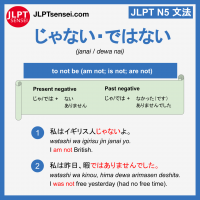
Click the image to download the flashcard.
Download all N5 grammar flashcards.
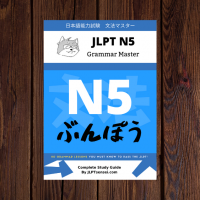
Download our complete
JLPT N5 Grammar Master E-book.
Access ALL extra downloads, ebooks, and study guides by supporting JLPT Sensei on Patreon.
じゃない・ではない - Oraciones de ejemplos 例文
Cada oración de ejemplo incluye ayudas como la lectura (hiragana) en Japónes, la lectura en romaji, y la traducción en Español.
Da clic en el siguiente botón rojo para alternar todas las ayudas, o puedes dar clic en los botones individuales para mostrar únicamente las que desees ver.
Ejemplo #1
あなたは一人じゃない。
Ejemplo #2
危険じゃないの?
Ejemplo #3
そんなつもりじゃなかった。
Ejemplo #4
ごめんなさい!わざとではありませんでした。
Ejemplo #5
肉はあまり好きじゃないです。
Ejemplo #6
若いころはやさいが好きじゃなかった。
Ejemplo #7
私は日本語が上手ではない。
Vocabulario 語彙
| Kanji 漢字 |
Kana カナ |
English 英語 |
|---|---|---|
| 私 | わたし | I; me |
| 先生 | せんせい | teacher suffix |
| イギリス人 | いぎりすじん | British person |
| やるべき | should do | |
| 昨日 | きのう | yesterday |
| 暇 | ひま | free time |
| 今 | いま | now |
| 危険 | きけん | dangerous |
| つもり | plan; intention | |
| わざと | intentional |
Ver todas las lecciones de gramática del JLPT N5
